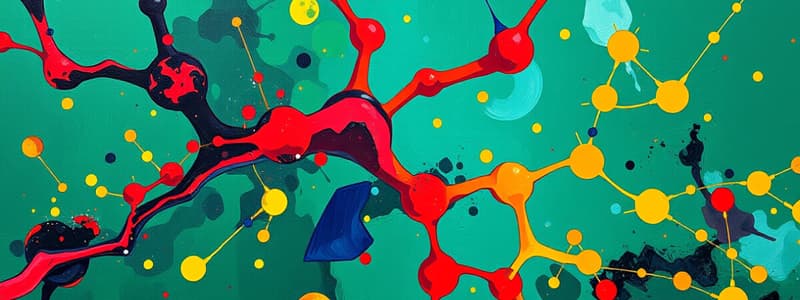Podcast
Questions and Answers
What kind of system is acetylcholine neurotransmitter?
What kind of system is acetylcholine neurotransmitter?
Cholinergic systems (nicotinic and muscarinic receptors).
The equation for acetylcholine neurotransmitter is ___.
The equation for acetylcholine neurotransmitter is ___.
Acetyl-coenzyme A + Choline = Acetylcholine = Acetate and Choline.
Describe peripheral use of acetylcholine as a neurotransmitter?
Describe peripheral use of acetylcholine as a neurotransmitter?
Neuromuscular junction - nicotinic receptors - contraction of muscle. Autonomic nervous system - muscarinic (target) and nicotinic (postganglionic neuron) - regulate visceral function.
Describe central use of acetylcholine as a neurotransmitter?
Describe central use of acetylcholine as a neurotransmitter?
Describe amino acids use as neurotransmitters, which are excitatory/inhibitory?
Describe amino acids use as neurotransmitters, which are excitatory/inhibitory?
Describe glutamate as a neurotransmitter?
Describe glutamate as a neurotransmitter?
Describe glycine as a neurotransmitter?
Describe glycine as a neurotransmitter?
Describe GABA as a neurotransmitter?
Describe GABA as a neurotransmitter?
What are the different monoamines that act as neurotransmitters?
What are the different monoamines that act as neurotransmitters?
Which of the monoamines are also catecholamines?
Which of the monoamines are also catecholamines?
How are catecholamines created?
How are catecholamines created?
Describe dopamine as a neurotransmitter?
Describe dopamine as a neurotransmitter?
Describe norepinephrine as a neurotransmitter?
Describe norepinephrine as a neurotransmitter?
Describe serotonin as a neurotransmitter?
Describe serotonin as a neurotransmitter?
Describe histamine as a neurotransmitter?
Describe histamine as a neurotransmitter?
Describe peptides (as a whole) as a neurotransmitter?
Describe peptides (as a whole) as a neurotransmitter?
If a neuron contains both a neuromodulator and a more traditional neurotransmitter, what happens with a small stimulus vs. a large stimulus?
If a neuron contains both a neuromodulator and a more traditional neurotransmitter, what happens with a small stimulus vs. a large stimulus?
Describe endogenous opioid peptides as a neurotransmitter?
Describe endogenous opioid peptides as a neurotransmitter?
Tell me about substance P?
Tell me about substance P?
Name a few other peptides?
Name a few other peptides?
Tell me about nitrous oxide as a neurotransmitter?
Tell me about nitrous oxide as a neurotransmitter?
Tell me about carbon monoxide as a neurotransmitter?
Tell me about carbon monoxide as a neurotransmitter?
What are the different types of receptors we talked about in this course?
What are the different types of receptors we talked about in this course?
Describe nicotinic acetylcholine receptors?
Describe nicotinic acetylcholine receptors?
Flashcards are hidden until you start studying
Study Notes
Acetylcholine
- Functions within cholinergic systems through nicotinic and muscarinic receptors.
- Biochemical synthesis involves acetyl-coenzyme A and choline, catalyzed by choline acetyltransferase; broken down by acetylcholinesterase into acetate and choline.
- Peripheral roles include muscle contraction at the neuromuscular junction and regulation of visceral functions in the autonomic nervous system.
- Central roles encompass autonomic regulation and selection of attention focus.
Amino Acids as Neurotransmitters
- Amino acids serve as primary neurotransmitters in the CNS, with two classifications:
- Excitatory: aspartate and glutamate
- Inhibitory: glycine and GABA
Glutamate
- Principal fast neurotransmitter involved in learning, development, and neuronal death following CNS injuries.
Glycine
- Functions as an inhibitory neurotransmitter, particularly affecting postsynaptic membranes in the brainstem and spinal cord.
GABA (Gamma-Aminobutyric Acid)
- Major inhibitory neurotransmitter in the CNS, particularly associated with interneurons in the spinal cord.
Monoamines
- Key neurotransmitters include dopamine, norepinephrine, serotonin, and histamine.
- Dopamine and norepinephrine are classified as catecholamines, derived from phenylalanine and tyrosine.
Catecholamine Synthesis
- Synthesized from phenylalanine through tyrosine to L-DOPA, then converted into dopamine, norepinephrine, and epinephrine.
Dopamine
- Influences motor activity, cognition, and motivation; critical in conditions such as Parkinson's Disease (low) and schizophrenia (high).
Norepinephrine
- Integral to the autonomic nervous system, facilitating fight-or-flight responses, as well as attention and vigilance.
Serotonin
- Regulates blood vessels, mood (low levels linked to depression), and sleep, affected by dietary tryptophan.
Histamine
- Concentrated in the hypothalamus, regulates hormonal functions, and plays a role in inflammatory responses.
Peptides as Neurotransmitters
- A broad category with diverse functions, primarily acting as neuromodulators rather than classical neurotransmitters.
Endogenous Opioid Peptides
- Includes endorphins, enkephalins, and dynorphins, involved in pain inhibition and hormonal regulation, binding to opiate drug receptors.
Substance P
- A neurotransmitter involved in pain perception, reflecting the importance of signaling in sensory pathways.
Other Peptides
- Significantly involved include ACTH, vasopressin, neurotensin, cholecystokinin, and somatostatin.
Nitric Oxide (NO)
- Functions as a neuromodulator affecting vascular regulation, neuronal cell death, and altering postsynaptic response to stimuli.
Carbon Monoxide (CO)
- Exhibits rapid, short-lasting effects that influence neurotransmitter release.
Types of Receptors
- Categories encompass acetylcholine, amino acids (glutamate, GABA), norepinephrine, dopamine, serotonin, and opioid peptides.
Nicotinic Acetylcholine Receptors
- Ligand-gated ion channels located at the neuromuscular junction and autonomic ganglia; play roles in memory and learning, with implications in Alzheimer's and neuronal development.
Muscarinic Acetylcholine Receptors
- Further elaboration needed for a complete overview.
Studying That Suits You
Use AI to generate personalized quizzes and flashcards to suit your learning preferences.



